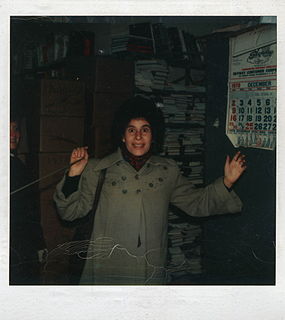A Quote by Ingrid Bengis
For me words still possess their primitive, mystical, incantatory powers. I am inclined to use them as part of an attempt to make my own reality more real for others, as part of an effort to transcend emotional danger. For me, words are a form of action, capable of influencing change. Their articulation represents a complete, lived experience.
Related Quotes
As usual, it occurred to me that words were the only thing that could possibly save me from this situation. This was a characteristic misunderstanding on my part. When action was needed, I was absorbed in words; for words proceeded with such difficulty from my mouth that I was intent on them and forgot all about action. It seemed to me that actions, which are dazzling, varied things, must always be accompanied by equally dazzling and equally varied words.
This is what Wisdom means: To be changed without the slightest effort on your part, to be transformed, believe it or not, merely by waking to the reality that is not words , that lies beyond the reach of words. If you are fortunate enough to be Awakened thus, you will know why the finest language is the one that is not spoken, the finest action is the one that is not done and the finest change is the one that is not willed.
The old idea that words possess magical powers is false; but its falsity is the distortion of a very important truth. Words do have a magical effect - but not in the way that magicians supposed, and not on the objects they were trying to influence. Words are magical in the way they affect the minds of those who use them.
Part of me loves and respects men so desperately, and part of me thinks they are so embarrassingly incompetent at life and in love. You have to teach them the very basics of emotional literacy. You have to teach them how to be there for you, and part of me feels tender toward them and gentle, and part of me is so afraid of them, afraid of any more violation.
Reality is not digital, an on-off state, but analog. Something gradual. In other words, reality is a quality that things possess in the same way that they possess, say, weight. Some people are more real than others, for example. It has been estimated that there are only about five hundred real people on any given planet, which is why they keep unexpectedly running into one another all the time.
Things are going so well. We’re volleying words back and forth. Everything she says, I have something I can say back. We’re sparking, and part of me just wants to sit back and watch. We’re clicking. Not because a part of me is fitting into a part of her. But because our words are clicking into each other to form sentences and our sentences are clicking into each other to form dialogue and our dialogue is clicking together to form this scene from this ongoing movie that’s as comfortable as it is unrehearsed.
Kids use words in ways that release hidden meanings, revel the history buried in sounds. They haven't forgotten that words can be more than signs, that words have magic, the power to be things, to point to themselves and materialize. With their back-formations, archaisms, their tendency to play the music in words--rhythm, rhyme, alliteration, repetition--children peel the skin from language. Words become incantatory. Open Sesame. Abracadabra. Perhaps a child will remember the word and will bring the walls tumbling down.
Words! Mere words! How terrible they were! How clear, and vivid, and cruel! One could not escape from them. And yet what a subtle magic there was in them! They seemed to be able to give a plastic form to formless things, and to have a music of their own as sweet as that of viol or of lute. Mere words! Was there anything so real as words?
At some of the darkest moments in my life, some people I thought of as friends deserted me-some because they cared about me and it hurt them to see me in pain; others because I reminded them of their own vulnerability, and that was more than they could handle. But real friends overcame their discomfort and came to sit with me. If they had not words to make me feel better, they sat in silence (much better than saying, "You'll get over it," or "It's not so bad; others have it worse") and I loved them for it.
Sociopaths differ fairly dramatically in how their brains react to emotional words. An emotional word is love, hate, anger, mom, death, anything that we associate with an emotional reaction. We are wired to process those words more readily than neutral, nonemotional words. We are very emotional creatures. But sociopaths listen as evenly to emotional words as they do to lamp or book - there's no neurological difference.




































